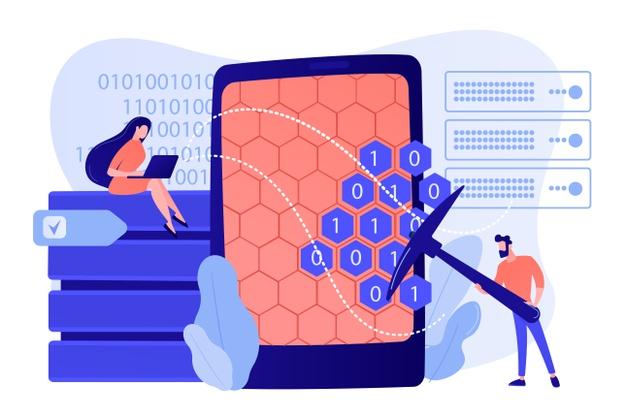As data mining methods advance, so do the job opportunities and challenges in this field. So you should understand both the advantages and disadvantages of being a data miner if you’re considering working in this field.
The following shares are compiled from my experience and that of other experienced data miners I work with. Let’s discover if this job is for you!
Who Is A Data Miner?
A data miner specializes in extracting valuable insights, patterns, knowledge, and trends from large and complex datasets using computers and tools (Python, R, SQL, and ML libraries).
Here are some specific tasks of this role:
- Collect data
- Explore data
- Analyze data
- Build models
- Present findings through data visualizations
- Interpret the results

If you’ve learned about data mining, you probably know that this field is demanding across various industries, leading to a lucrative career with diverse career paths. However, every profession has its drawbacks.
Let’s analyze this job’s pros and cons!
As I’ve mentioned, this job brings rewards in terms of income and career paths. Besides, it gives you chances to discover new insights and solutions as well as continuous learning.
1. Lucrative Career
Being a data miner offers a highly lucrative career path, with the potential to earn a substantial income. Specifically, the average salary for jobs that require data mining skills in the US is an impressive $86,940 per year, making it one of the highest-paying fields in the tech industry.
So, why is being a data miner so darn lucrative? Data mining expertise is highly sought across several industries as businesses increasingly value making decisions from data.
Besides data mining, this role requires specialized knowledge and skills commanding a premium paycheck, such as:
- Data analysis
- Machine learning
- Statistics
But it’s not just about the money. The insights you uncover can change the game for a company. That’s pretty darn satisfying, right?

2. Diverse Career Paths
Regarding the career path, the good thing is that data mining skills can open doors to many different careers, so you can choose what fits you best. Here are some options:
- Business analyst
- Machine learning engineer
- Data scientist
- Quant
- Healthcare analyst
- Marketing analyst
- Government worker
- Researcher
- Consultant
This diversity ensures you find roles that align with your interests, expertise, and the industries you are most passionate about.
3. Discovery of New Insights and Methods
What’s really cool about being a data miner is the excitement of discovering something new. In this role, I love to figure out how customers behave, predict what might happen in the market, and find new methods in the working process.
As a result, I can help develop cutting-edge products, services, and strategies. My job can transform how businesses operate.

4. Fostering Continuous Learning
Being a data miner means I’m always learning because the tech I use, including tools and methods, is changing. Each project provides feedback, helping me refine my techniques and learn from successes and mistakes.
Moreover, data mining blends different fields like math, statistics, and computer science. So, I need to keep expanding my knowledge in these areas to do well in my job.
While this job has many pros, it comes with cons, including complex tools, privacy concerns, and large database requirements.
5. Complex Tools
One of the challenges of being a data miner is dealing with complicated computer tools and software. These tools are essential for my work but are hard to learn because they involve many different programs, coding languages, and special computer programs.
Also, with so many tools for the job, it can be challenging to decide which is best for a particular project, especially for people just starting in this field because there’s a lot to learn.
6. Privacy Concerns

In this role, I often work with personal and sensitive data; this brings up important ethical and legal issues. So, I must be very careful to ensure I don’t accidentally reveal someone’s private data.
I must ensure that insights derived from data are used responsibly and do not harm people or communities. Managing these ethical practices and knowing the possible consequences of misusing data is tricky, especially in big projects.
7. Large Database Requirement
Managing and processing large datasets need powerful machines and systems, which can be expensive to set up and maintain.
If your company does not invest in these settings, your performance will not be optimal; this can slow down our projects and make it harder to get quick results.
Moreover, ensuring data is safe, accurate, and available when needed becomes more complicated as the data grows. In such cases, proper data management and governance are crucial to avoid problems.
Is It Worth Becoming A Data Miner?

To know if becoming a data miner is right, I recommend considering your career goals and what you enjoy. If you find digging into data exciting and like finding answers to real-world problems, data mining might be a good choice.
Another good thing is that data mining skills can be helpful in many jobs, not just data mining itself. So, even if it’s not your main job, learning these skills can be handy in today’s world, where data is everywhere.
But remember, in this role, you’ll have to keep learning, be responsible with data, and sometimes deal with tricky technical problems.
Wrap Up
I’ve shared the pros and cons of being a data miner in this guide. I hope this journey has given you a better picture of what it’s like to be a data miner today.
Every job has its challenges and rewards. Your passion for data, problem-solving, and learning will be the deciding factor in whether this path is right for you.
No matter what you choose, I wish you a fulfilling career aligned with your goals and dreams!
